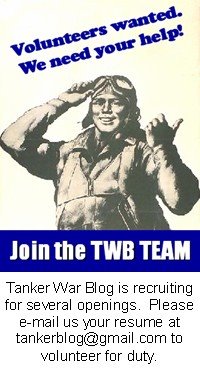 There have been many famously wrong predictions that various wars would be over by Christmas.
There have been many famously wrong predictions that various wars would be over by Christmas.In World War I, Britain politicians as they declared war against Germany on 4 August claimed the war would be over by Christmas. Lord Kitchener, the newly appointed Secretary of State for War, knew better. The war he warned would take at least three years and would be decided by the last million men that Britain could throw into battle.
After the Inchon landing and the successful routing of the North Korean army in 1950, General Douglas MacArthur predicted that the Korean War would soon be over and that the troops would be home by Christmas. The Chinese had a different opinion and the war went on for another two and half years.
Most had hoped that the Tanker War would long be over by Christmas. In fact, many optimistic tanker war participants had hope with the imminent ruling by the GAO, and possibly the WTO, this month that the war might essentially over by Labor Day.
But the Tanker War, like most conflicts, seems to have its own idea of how long it should go on. And, the recent resignations of the Air Force Secretary and Chief of Staff might only make its timeline longer.
The resignations have left that service's leadership in a state of turmoil, and such confusion rarely leads to decisive action. This Reuters' article has some good quotes from various analysts pointing this out:
"Inevitably this will create confusion as to the fate of programs like the trans-Atlantic tanker deal and the next search and rescue helicopter," said Loren Thompson of the Virginia-based Lexington Institute.
...Jim McAleese, a Virginia-based defense consultant, said the resignations would undoubtedly result in additional oversight ...
McAleese said the departures could also have a sort of "paralyzing effect" on the tanker contract, particularly if government auditors upheld all or part of the Boeing protest.
"For the first time, it raises the possibility that any reworking of the competition might have to wait until the next administration," he said....
Rob Stallard, defense analyst at Macquarie Capital in New York, said finalizing big weapons programs was always tough in an election year, but this would make it even more difficult. "If anything, this just kind of slows the process down," Stallard said.
Needless to say a delay in sorting out the protest and the contract this is not good news for the Air Force.
For us here at Tanker War Blog this is not exactly good news either. Unlike the KC-30 PR team, that can just renew their established lobbying and political "war room" contracts, our unpaid all volunteer force will now have to be asked to reenlist for up to another 6 months.
This is a lot to ask, but rest assured that for now the team here remains dedicated to the cause and unwavering in its mission to voice our concerns over the tanker contract. Also, we may have to expand/replenish our current group of contributors, so you might just see a recruiting pitch from us in the future.




 Stumble It!
Stumble It!
3 comments:
does all volunteer mean you're not smart enough to get paid for doing Boeing's dirty work?
i am sure if it was for northrop they would have sent a heap of cash their way. money can't buy everyone just Dirty ones
Let's face it, many of the US Weapons System Programs procurement decisions have been much less than pristine. The M-1 tank was NOT the better option, but Congress conspired with DOD to bail out Chrysler through Chrysler Defense. The M-1 was eventually brought up to a reasonable standard, at dramatically increased expense, and Ford Aerospace was tossed a bone to keep their mouths shut (The Division Air Defense Gun). The F-18 was initially the loser in a contest with the F-16, but was practically re-engineered to become an effective weapon system. All too often, however, the US public has gotten NOTHING for their money (the DIVADS and T-46 programs come to mind)
http://www.fas.org/man/congress/2000/000510-mcnaugher_may_10.htm
http://en.wikipedia.org/wiki/Fairchild_T-46
It seems that if the tanker contract were truly as open and transparent a process as it was supposed to be, the Air Force would have little difficulty justifying their source selection. There should have been criteria in the request for proposal that could have objectively demonstrated why the selection was made as it was. The difficulty appears to be that the criteria in the RFP were NOT in fact the criteria by which the source selection was made. That being the case, the whole thing kind of becomes indefensible on the basis of virtue, and now will simply be hammered out in the political arena without respect to which system would have better served the warfighter.
Post a Comment